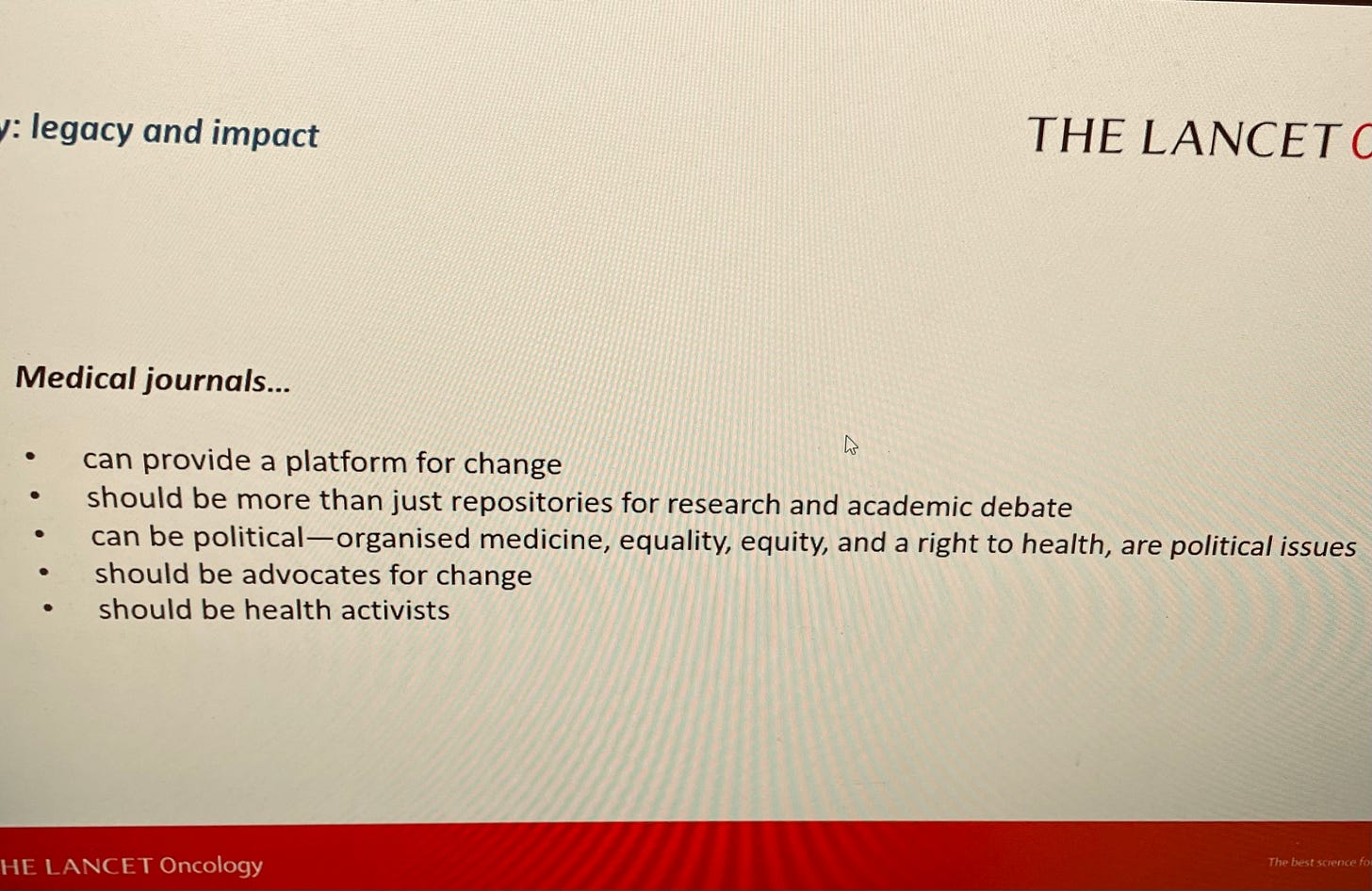Peer-reviewed propaganda: The new mission of scientific and medical journals
The integrity of the medical profession in jeopardy
By Anonymed (an anonymous Canadian Doctor)
In 2010, fully twelve years after its publication, The Lancet retracted a paper linking administration of the vaccine against Measles Mumps and Rubella (MMR) to the development of autism. After years of outcry from the medical community, and ongoing doubts about its methodology and conclusions, it was pulled.
In 2007, the journal published another highly controversial paper, this time about the estimated civilian death toll from Operation Iraqi Freedom. The authors’ methods included the controversial practice of asking respondents (on the ground, in a war zone) how many people lived in a given area before and after the invasion. The net change in population density was used to estimate the number of deaths caused by the conflict. Notwithstanding serious concerns about its data, including a widely-circulated but erroneous graph that the journal kept despite significant doubts about its veracity, the paper still stands.
I have no window into the inner workings of The Lancet’s peer review process. Clearly the journal is capable of publishing quality scientific research - it has the highest impact factor in the world at 202.7(!) - but its reputation as a leader in the scientific and medical world did not preclude its politicization.
If we're being charitable, the MMR-autism paper illustrates the fact that journals occasionally publish things that turn out to be flat-out wrong, no matter how rigorous the review process. Reviewers can be misled, data can be opaque, study authors may be deceptive or incompetent (or both), and the decision to publish can be in error. With this particular paper, one could argue the process worked more or less like it’s supposed to. After a long back and forth, the paper was found wanting and the journal retracted it. Sure, it took twelve years and did a lot of damage in the meantime, but fine.
The Iraq War death-toll article, on the other hand, suggests that journals can be more than just wrong. They can be intentionally, willfully wrong - sometimes for transparently political purposes. Seeking to accurately describe the cost of war using scientific methods is one thing. But casting aspersions on Operation Iraqi Freedom was a cause celeb, and The Lancet editorial board appeared to buy into the grotesque narrative that the United States was committing some kind of genocide in Iraq. It seems that this bias not only led its editors to accept and publish a paper with dubious methodology, but keep it up even once the errors therein were pointed out.
Getting things wrong is part of the scientific process. When journals intentionally choose narrative over fact, we have a problem.
As you can imagine, things have only gotten worse in the intervening years. Through their flirtation with gender ideology, prestigious journals like Nature and Science now tacitly claim that all those studies they published about sex differences and medical illness were just a bunch of socially constructed hooey. The once great Scientific American got itself into the “math is white supremacy” business. And our very own Canadian Medical Association Journal (CMAJ), impact factor 16.9, has essentially declared itself a low-rent megaphone for Critical Race Theory and its accoutrements. This is just off the top of my head. The complete list is Torah-length.
We really are living in a new reality. While many of us viewed the Iraqi casualty statistics as ideologically motivated hyperbole, the journal itself always maintained that it was acting with the utmost scientific scrutiny in publishing such findings. It may have been playing politics behind the scenes, but no self-respecting journal would ever cop to naked editorial bias.
Times have changed. We now live in a world where to be neutral and objective is to uphold one system of oppression or another. This view is increasingly internalized in our educational institutions and the journals are following suit. In order to pay the bills, scientific publications must claim to be an objective source of information while simultaneously denouncing the concept of objectivity as a white-people predilection. Sounds tricky.
A colleague of mine recently sent me a series of screenshots from a presentation by the editor of The Lancet Oncology (not as influential as its parent publication, but not the CMAJ either), wherein this talking head, a man named David Collingbridge, stated with a terrifying insouciance that journals should cease to be places of objective free inquiry.
A single slide in that presentation is enough to demonstrate medicine’s ideological capture:
What kind of a message does this send? No doubt he thinks he’s being progressive - progressives always do. But, again, progressing toward what? If the foundation of a medical journal is no longer objective free inquiry and pursuit of Truth, what and who decides what ought to be advocated for?
It seems many in today's medical world are convinced that since (they believe) the scientific and medical establishment of old was biased and political in one direction, a corrective bias in “the right direction” is warranted. Hell, given that the proper stewards are finally in charge, why not a little overcorrection for the road? This is a highly cynical way to look at the history of medicine, but it appears to be the prevailing outlook of more than a few of those in charge.
Where did such people get these ideas? Who told them, as they were making their way through medical school, that the truth is not enough? That medicine is a big bowl of bias and bigotry? The answer is, we did. For years, we have been feeding students a healthy diet of ahistorical flagellation fodder and now the chickens are coming home to roost.
Author Douglas Murray was once asked for his vote on the proudest moment in the history of his native Great Britain. His answer was intentionally provocative, but no less salient for that fact: “Amritsar” he said. As the capital of Sikhism and the site of its famed Golden Temple, Amritsar is a revered and holy place. It is also the site of one of the worst massacres in the history of the British Empire. In 1919, a British Commander ordered his men to fire on a crowd of unarmed civilians, killing (at least) several hundred of them. Why would anyone be proud of that? As Murray explained, the fact that Amritsar has become a byword for British colonial violence is itself an admission that, as far as colonial powers go, Britain was by-and-large a moral one. While the West’s detractors view this atrocity as evidence of colonial evil, such horrible exceptions actually prove the rule, which is that even at its most culturally imperialistic, the standard was something approximating honour and integrity.
This is how I feel about medicine. Students are constantly warned about the profession’s “hidden curriculum,” which, among other vices, allegedly serves to uphold the cis-hetero-patriarchy, colonialism, racism, ableism and so on. In addition to tarring the profession with semi-literate epithets, the notion of this hidden system of badness serves to undermine medicine’s entire history. In this worldview, the profession’s errors are not aberrant, but ingrained, and prejudice is part of the project.
It is of course true that medicine has at different times been racist, sexist, homophobic, antisemitic, anti-Catholic, and probably anti a bunch of other stuff too. From boardrooms to the bedside, there have been grave mistakes. It is important to learn about Tuskegee and Buchenwald and Fernald, lest we be condemned to repeat them. But current teaching is not about learning from past mistakes. The so-called “hidden curriculum” is about imposing original sin. It is who we are, and the profession’s evils flow predictably from this foundation. The only solution, according to people who think this way, is transformational change - is revolution.
Trumpet this mindset long enough and you will get something approximating today’s medical culture - self-hating, unmoored, and prone to compensatory moral grandstanding. What does this have to do with journals going woke? Everything. Leftist culture warriors know full well that disconnecting people from their history - national, cultural or professional - is essential to building the activists of the future. If you truly think your past is irredeemable, violent and corrupt, then objectivity and political neutrality will smell like mere appeasement. It will no longer appear reasonable to just be “a repository of information.” Activism will seem like the only moral choice.
The integrity of the medical profession has perhaps never been in as much jeopardy as it is today, and few physicians seem to appreciate how far down the rabbit hole we already are. Like other institutions in the West, medicine's propensity for reflection and self-criticism has been weaponized by people who think the whole thing must be torn down and built up anew. Having a standard of free inquiry and objectivity and honour and failing at times to live up to it isn’t the same thing as presiding over a fundamentally rotten foundation. Regardless, the solution is certainly not to dispense with the standard altogether in favour of the fever dreams of the self-appointed guardians of a utopian future.
___
Thanks for reading. For more from this author read, Apology Psychology: The Sorry State of a Canadian Quirk
There are now two ways to support Woke Watch Canada through donations:
1) By subscribing to the paid version of the Woke Watch Canada Newsletter for - $5 USD/month or $50 USD/year
2) By donating to the Canadian School Board Investigation fund, which is raising money to expand Woke Watch Canada’s research and investigation into dysfunctional Canadian school boards.






Thanks for the excellent and interesting post!
Unfortunately, much of the social sciences and humanities have been tainted with such agenda-driven research for decades, gradually culminating to what we are now watching spilling over to the hard sciences/medicine and general society. This includes the main traditional disciplines, not just the recently made up fields of "XXX-studies".
For instance, for several years now there have been authors in academic philosophy openly arguing for something like a complete overhaul of basic epistemic standards--things that have been discussed by philosophers for thousands of years--to align with promoting 'woke' agendas. Needless to say, such 'research' is of a quality that wouldn't be accepted in the prestigious venues where it has been published, had it not for its advocacy of fashionable political ideas.
I have to wonder if Mallory Walker has ever heard of Trofim Lysenko. I have to assume yes, but I guess like all activists, Mallory's politicization of science will go well, is done with the best of intentions, and will have no unintended consequences.